高级综合商务英语2 Unit3
新世纪商务英语综合教程第二册课后答案unit 3
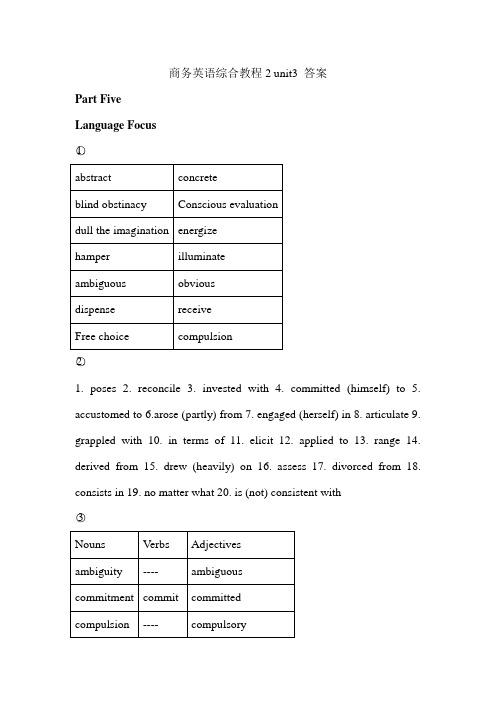
商务英语综合教程2 unit3 答案Part FiveLanguage Focus○1.○2.1. poses2. reconcile3. invested with4. committed (himself) to5. accustomed to6.arose (partly) from7. engaged (herself) in8. articulate9. grappled with 10. in terms of 11. elicit 12. applied to 13. range 14. derived from 15. drew (heavily) on 16. assess 17. divorced from 18. consists in 19. no matter what 20. is (not) consistent with○3○41. broken2. trembling3. crying4. burning5.smiling6. frightened7. approving8. approved9. cleaning 10. parkedComprehensive Practice○1Fill in each of the following blanks with an appropriate word.1. how2. that3. where4. encountered5. on6. it7. choose8. on9. engaged 10.degree 11.with 12. school 13. with 14. finance 15. men 16.even 17.the○2Fill in the blanks with the following adverbs from the texts. Consult your dictionaries when necessary.1.effectively2.practically3. passively4. increasingly5. potentially6. seemingly7. rarely8. occasionally9.expressly 10.Ultimately 11.merely 12.collectively 13.inevitably 14.Barely 15.repeatedly○3Translation the following into English, using words and phrased given in brackets.1. Education is the acquisition of the art of the utilization of knowledge.2. The function of a university is to enable students to shed details in favor of general principles.3. The Harvard Business School pioneered the “case method”, in which students evaluate and debate a dilemma a company encountered in real business situations.4. The transition from finance chief to business-school lecturer isn’t always easy. There are some prerequisities for CFOs-turned-lecturers. It’s important to have an “excellent reputation”in the field, be good with people and, most important, be able to engage with students.5. But many of you are now wondering how these commitments fit with a career choice. Is it necessary to decide between remunerative work and meaningful work? If it were to be either/or, which would you choose? Is there a way to have both?○4Interpret following passage in EUniversities will need to adapt to the changing opportunities that the changing world brings. In the future, education is going to be much more of a lifelong demand. We are seeing already the end of what one might call the fuel tank model of education, where people fill themselves up with knowledge when they are young, gradually deplete their knowledge as they work through a lifetime, then retire. The opportunities to deliver knowledge to people who are thousands of miles away are greatlymagnified by the Internet. So the work of teaching—who we teach and how we teach them—will change.Hence, I am firmly convinced that if in one era the wealth and success of a society depended on how well it grew food, and if in another era, the wealth and success of a society depended on how well it produced and used steel, in the world that we are headed into , the wealth and success of a society will depend on how it produces and how it used knowledge. And I am firmly convinced there will be no more important institutions to this new world than universities. The most enduring tradition of university is that we are forever young, forever committed to renewing ourselves. That must be the work of universities around this world. Writing skills○11. Wordy Many unskilled workers without training in a particular job are unemployed and do not have any work.Concise Many unskilled workers are unemployed.2. wordy Critical-care nurses must have steady nerves to care for patients who are critically ill and very sick.Concise Critical-care nurses must have steady nerves to help patients who are very sick.3. wordy Because the circumstances surrounding the cancellation of classes were murky and unclear, the editor of the student newspaperassigned a staff reporter to investigate and file a report on the circumstances.Concise Because the circumstances leading to the cancellation of classes were unclear, the editor to the student newspaper assigned a staffer to investigate and report the story.4. wordy Some Vietnam veterans coming back to the United States after their tours of duty in Vietnam had problems in readjusting again to life in America.Concise Some Vietnam veterans had problems in readjusting to life in America.5. wordy The peace talks progressed forward.Concise The peace talks progressed.6. wordy John and his brother are competing together in the running games.Concise John and his brother are competing in the running games.7. wordy This is the place where I left him.Concise This is where I left him.8. wordy That was the time when I hit a home run.Concise That was the time I hit a home run.9.wordy The reason I want to take that class is because the professor is supposed to be very eloquent.Concise The reason I want to take that class is that the professor issupposed to be very eloquent.10. wordy Mary repeated the question again slowly so that Jim would understand.Concise Mary repeated the question slowly so that Jim would understand. ○2cross out the redundant word in each of the following sentences1. performance2. again3. identical or the same4. enough or sufficient5. back6. forward7.together8.new 9 together 10 two。
综合英语2(商务)(已完成)unit-3'

• Sony Corporation, is a Japanese multinational
conglomerate corporation headquartered in Tokyo, Japan.[4] Its diversified business
includes consumer and professional
electronics, gaming, entertainment and financial services.[2] The company is one of the
leading manufacturers of electronic products for the consumer and professional markets.[5]
technology
• A hybrid car
• Retailing • Construction建筑公司 • Tourism • Banking and finance • Transport • vehicle manufacturing • IT(Information Technology)/Electronics • Food and drink • Pharmaceuticals/chemicals 制药/化工 • others
Sony is ranked 116th on the 2015 list of Fortune Global 500.[6]
Listening: a successful company
• Have you ever visited an IKEA store?
• Ikea: a Swedish furniture store
Unit 3
新世纪高职高专综合英语 2 unit 3
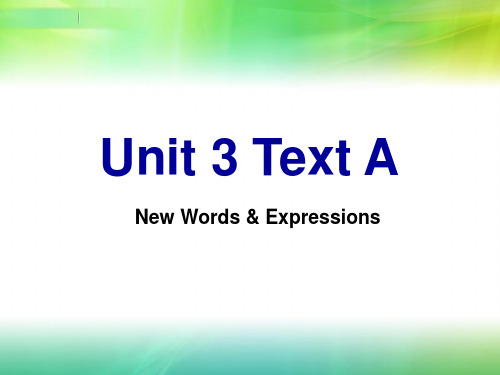
• merely 仅,只,不过
e.g. It’s not merely a matter of cost, but whether they could come up with high quality products.
advance
① n. a change, discovery, or invention that brings progress 进步,发展 e.g. Recent advances in biotechnology have raised moral questions. ②vi.if something such as technical or scientific knowledge advances, it develops and improves 进步 关于人类行为的研究从20世纪20年代开始已经有了快速进步。 e.g. The research on human behavior has advanced rapidly since the 1920’s.
mark
① vt. to be a sign of an important change or an important stage in the development of something 标志着... e.g.His third film marks a major advance in cinematic techniques. ② vt. to write or draw on something, so that someone will notice what you have written 做标记 这条路线已标有记号,很容易跟着走。 e.g. The route has been marked so that it is easy to follow. ③ n. a shape or sign that is written or printed (书写或印刷的)符号 e.g. Her letter was full of exclamation marks.
商务英语综合教程 第二册第3课
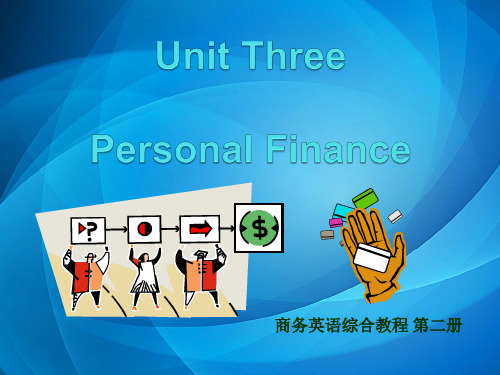
Quiz: Word Derivation (con.)
4. Already, the big state banks ________ the central government and dished out almost all the loans they were targeted to extend for the whole year. (ignorance)
1. The buyers bid against each other and often ________ the prices they pay. (inflation)
2. The ________ sell pirated DVDs, some of which are even uncensored movies. (peddle)
But when it comes to home finances, you probably are not so detail-oriented. In fact, my experience is that too many people rely on others (whether a partner or a paid adviser) to make decisions about their finances.
capture bliss enduring outlive mortgage peddle
amortization deduction write-off outright exceed inflation
商务英语综合教程2第二版王立非Unit3答案
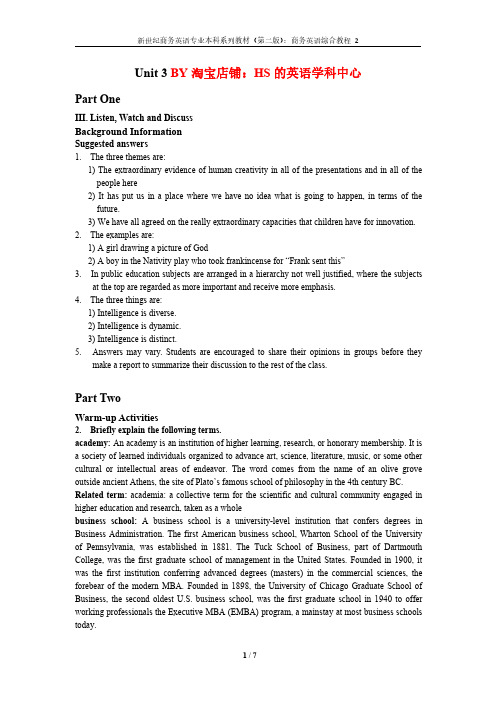
Unit3BY淘宝店铺:HS的英语学科中心Part OneIII.Listen,Watch and DiscussBackground InformationSuggested answers1.The three themes are:1)The extraordinary evidence of human creativity in all of the presentations and in all of thepeople here2)It has put us in a place where we have no idea what is going to happen,in terms of thefuture.3)We have all agreed on the really extraordinary capacities that children have for innovation.2.The examples are:1)A girl drawing a picture of God2)A boy in the Nativity play who took frankincense for“Frank sent this”3.In public education subjects are arranged in a hierarchy not well justified,where the subjectsat the top are regarded as more important and receive more emphasis.4.The three things are:1)Intelligence is diverse.2)Intelligence is dynamic.3)Intelligence is distinct.5.Answers may vary.Students are encouraged to share their opinions in groups before theymake a report to summarize their discussion to the rest of the class.Part TwoWarm-up Activities2.Briefly explain the following terms.academy:An academy is an institution of higher learning,research,or honorary membership.It is a society of learned individuals organized to advance art,science,literature,music,or some other cultural or intellectual areas of endeavor.The word comes from the name of an olive grove outside ancient Athens,the site of Plato’s famous school of philosophy in the4th century BC. Related term:academia:a collective term for the scientific and cultural community engaged in higher education and research,taken as a wholebusiness school:A business school is a university-level institution that confers degrees in Business Administration.The first American business school,Wharton School of the University of Pennsylvania,was established in1881.The Tuck School of Business,part of Dartmouth College,was the first graduate school of management in the United States.Founded in1900,it was the first institution conferring advanced degrees(masters)in the commercial sciences,the forebear of the modern MBA.Founded in1898,the University of Chicago Graduate School of Business,the second oldest U.S.business school,was the first graduate school in1940to offer working professionals the Executive MBA(EMBA)program,a mainstay at most business schools today.There are four principal forms of business school.1.Most of the university business schools are faculties,colleges or departments within the university,and teach predominantly business courses.2.In North America a business school is often understood to be a university graduate school which offers a Master of Business Administration or equivalent degree.3.Also in North America the term“business school”can refer to a different type of institution:a two-year school that grants the Associate’s degree in various business subjects.Most of these schools began as secretarial schools,then expanded into accounting or bookkeeping and similar subjects.They are typically operated as businesses,rather than as institutions of higher learning.4.In Europe and Asia,some universities teach business only.liberal arts:The term liberal arts is described in Encyclopedia Britannica as a“college or university curriculum aimed at imparting general knowledge and developing general intellectual capacities,in contrast to a professional,vocational,or technical curriculum.”In Classical antiquity,the term designated the education proper to a freeman(Latin liber,“free”)as opposed to a slave.In the medieval Western university,the seven liberal arts were grammar,rhetoric,and logic(the trivium)and geometry,arithmetic,music,and astronomy(the quadrivium).In modern colleges and universities,the liberal arts include the study of literature,languages,philosophy, history,mathematics,and science that provide information of general cultural concern.liberal education:The term liberal education has its origins in the medieval concept of the liberal arts but now is primarily associated with the liberalism of the Age of Enlightenment.Liberal education is termed“a philosophy of education that empowers individuals with broad knowledge and transferable skills,and a stronger sense of values,ethics,and civic engagement... characterized by challenging encounters with important issues,and more a way of studying than a specific course or field of study”by the Association of American Colleges and Universities (AACU).Usually global and pluralistic in scope,it includes a general education curriculum which provides broad exposure to multiple disciplines and learning strategies in addition to in-depth study in at least one academic area.case study:Some business schools center their teaching around the use of case studies.Case studies have been used in graduate and undergraduate business education for nearly one hundred years.When Harvard Business School was founded,the faculty quickly realized that there were no textbooks suitable to a graduate program in business.Their first solution to this problem was to interview leading practitioners of business and to write detailed accounts of what these managers were doing.Of course the professors could not present these cases as practices to be emulated because there were no criteria available for determining what would succeed and what would not succeed.So the professors instructed their students to read the cases and to come to class prepared to discuss the cases and to offer recommendations for appropriate courses of action.Basically that is the model still being used.Business cases are historical descriptions of actual business situations.Typically,information is presented about a business firm’s products,markets,competition,financial structure,sales volumes,management,employees and other factors affecting the firm’s success.The length of a business case study may range from two or three pages to30pages,or more.Text IComprehension CheckI.Reading for general ideas1.Fill in the blanks to complete the outline of the text.Suggested answersThesis statement:The proper function of a university is the imaginative acquisition of knowledge (imparting knowledge imaginatively;transforming knowledge with imagination).Heading for Part I(Paragraphs1to4):Introduction of the topic:the reason for the existence of universitiesHeading for Part II(Paragraphs5to9):Modern directions in university theory and practice as represented by the modern business schoolHeading for Part III(Paragraph10):Conclusion of the text:the proper function of a university 2.Read the text through quickly and answer the following questions.(1)College education and function of universities.(2)Universities serve as the connection between knowledge and the zest of life.(3)To produce men with a greater zest for business.(4)Business organization requires an imaginative grasp of:•the psychologies of populations engaged in differing modes of occupations and scattered all over the world;•conditions in different zones;•the interlocking interests of great organizations and the reactions of the whole complex to any change in one of its elements;•laws of political economy;•the habits of government and their variations under diverse conditions;•the binding forces of any human organization;•the laws of health,fatigue and the conditions for sustained reliability;•the social effects of the conditions of factories;•the role of applied science in modern society;•the discipline of character that enables people to make decisions based on reasonable evaluation of relevant alternatives.(5)A university should prepare business students for their career by promoting imaginativeconsideration of the various general principles underlying their career in particular.II.Reading for specific informationKey1.F2.T3.F4.T5.FIII.Reading and making interpretationsSuggested answer1.The reason why a university is necessary is that it maintains the relation between knowledgeand passion for life,by unifying the fanciful thinking of the young and the experience of the old in the learning process(so as to see more possible ways of applying the knowledge).2.Today in order to run a big business successfully,one has to develop an imaginativeunderstanding of the interlinking benefits of large corporations and the adaptations made by the unified business entity to meet the new conditions in any one of its branches.3.The management of a modern business demands its employees to apply their knowledgeimaginatively,which used to be an ability cultivated in other professions.4.There can be no blame on the custom,but the continuing usual or normal way of working in acorporation tends to blunt or suffocate the imaginative power/make the imagination less sharp and clear.5.For this reason,instead of doing menial work following a routine blindly,a well-educatedman should acquire the ability of imaginative thinking through proper training which both provides detailed facts and helps develop ways of working and thinking that are necessary for the profession.Part ThreeBackground InformationSuggested answers1.The case method is a teaching approach that uses decision-forcing cases to put students in therole of people who were faced with difficult decisions at some point in the past.In sharp contrast to many other teaching methods,the case method requires that instructors refrain from providing their own opinions about the decisions in question.Rather,the chief task of instructors who use the case method is asking students to devise and defend solutions to the problems at the heart of each case.Case method is the best way to prepare students for the challenges of leadership.simply stated, it calls for discussion of real-life situations that business executives have faced.Casewriters,as good reporters,have written up the situations to present students with the information available to the executives involved.As students review their cases,they will have to put themselves in the shoes of the managers,analyze the situation,decide what they would do,and come to class prepared to present and support their conclusions.2.The case method is a profound educational innovation that presents the greatest challengesconfronting leading companies,nonprofits,and government organizations—complete with the constraints and incomplete information found in real business issues—and places the student in the role of the decision maker.There are no simple solutions;yet through the dynamic process of exchanging perspectives,countering and defending points,and building on each other’s ideas,students become adept at analyzing issues,exercising judgment,and making difficult decisions—the hallmarks of skillful leadership.Read and thinkSuggested answers1.Steps of learning by the case method:•Before class:students read and reflect on the case,and then meet in learning teams to “warm up”and discuss their findings with other classmates;•In class:under the questioning and guidance of the professor,students probe underlying issues,compare different alternatives,and suggest courses of action in light of the organization’s objectives.Text IIComprehension CheckI Reading for specific informationSuggested answers1.In the1920s.2.An HBS case is a detailed account of a real-life business situation,describing the dilemma ofthe“protagonist”—a real person with a real job who is confronted with a real problem.All cases center on one overarching question:What should the protagonist do?In their two years at HBS,students study more than500cases.3.In the past students passively receive knowledge that has not much to do with businessreality and study with people they barely know.In HBS they get actively involved in the learning process and study with other students in groups on problems closely related to actual business situations.4.A“cold call”is a provocative question the professor poses to one specific student to open thecase and ignite the thinking of the section as a whole.HBS professors engage all students in discussion,challenge students’thinking and skillfully guide them through the complex business situations described in the cases.5.The HBS approach to the case method of teaching may present the most demanding,engaging,and provocative way to equip students with the skills of leadership,short of actually serving as a CEO.The extraordinary success of HBS alumni has proved that HBS graduates can achieve significant results in the real world.II.Reading and making interpretationsSuggested answers1.By doing so,the case method has changed the commonly-accepted mode of teaching andlearning,in which the professor gives informative lectures and students receive the knowledge in a passive way without any feedback or response.2.Created and developed by the teaching staff of HBS in the1920s,the case method started as a method of introducing authentic business cases in the classroom so as to infuse life and real meaning into the teaching of management.3.Though the cases vary,almost all of them focus on one important question:How could themanager find a way out of the dilemma he/she encountered in a real business situation?4.Unlike in traditional classrooms,the professor does not do all the talking.Rather he plays therole of a conductor in an orchestra,to encourage and direct all the90students to discuss the case freely and critically,one after another,by analyzing and synthesizing the facts.5.Seldom does the class end with a satisfactory solution to the problem faced by the managerin the case.The students are more likely to have a good understanding of the complicated elements involved in the case,a clear idea about how to choose suitable ways to analyze and evaluate the problem,and a personal experience of how to handle all the uncertainties in real business situations.Part FourText IIIQuestions for group discussionSuggested answers1.“What is the meaning of life,President Faust?What were these four years at Harvard for?President Faust,you must have learned something since you graduated from college exactly 40years ago?”2.These questions reflect the doubt and concern of the graduates about the connection betweenthe four years at Harvard and the future,and about the significance of college education.Surprisingly,students are not so interested in the curriculum or advising or faculty contact or even student space,as in why so many Harvard students are going to Wall Street.3.She thinks that students are asking her about the meaning of life with questions in the disguiseof senior career choices of Harvard students.4.They are worried because they want their lives not just to be conventionally successful,but tobe meaningful,and they are not sure how those two goals fit together.They are worried whether a generous starting salary at a prestigious brand name organization together with the promise of future wealth will feed their souls.5.Answers may vary.More informationUnlike the previous two texts,Text III is longer and the language structures are more complex. Students may need to read it more than once.The first reading should aim for general understanding.General questions can be asked before students connect the text with their own experience and culture.Part FiveStudy SkillsSuggested answersSynonyms Antonymscapable a.skilled,competent,qualified,apt,fit,able,highly-skilled incapable,incompetent, unable,unqualified, inadequate,inapt,ineptincrease v.improve,augment,amplify,add on to,buildup,extend,enhance,strengthen,upsize,expand,raise,magnify,enlarge,get big,escalate,grow decrease,diminish,lower, reduce,bring down,lessen, turn down,drop,cut,pull down,take downintelligent a.smart,able-mined,bright,clear-headed,quick-witted,sapient,sharp-witted silly,blockheaded,brainless, dopey,unwise,weak-mined, wooden-headed,foolish, dull-witted,dumbdangerous a.unsafe,perilous,adventurous,precarious,risky safe,risk-free,riskless,sure, securefantastic a.fabulous,imaginary,unrealistic,fanciful,unbelievable,great ordinary,commonplace, everyday,common, unexceptional,normal,average,conventional,customary,fair,unsophisticated,awful,usual Grammarplete each of the following sentences with the word given in brackets,formingparallel structures.Key(1)running(2)sing(3)slicing(4)words(5)attending2.Rewrite each of the following sentences,correcting any errors in parallelism. Suggested answers(1)We must either raise revenues or reduce expenses.(2)Peter denied the importance of such things as wealth,good family background,and a goodreputation.(3)In his farewell address to the army,the general praised his soldiers for their unsurpassedcourage and thanked them for their devotion.(4)The police have a duty to serve the community,safeguard lives and property,protect theinnocent against deception,and respect the constitutional rights of all.(5)My sister’s promotion means that she will be moving to another city and taking the childrenwith her.。
unit-3-商务英语综合教程2
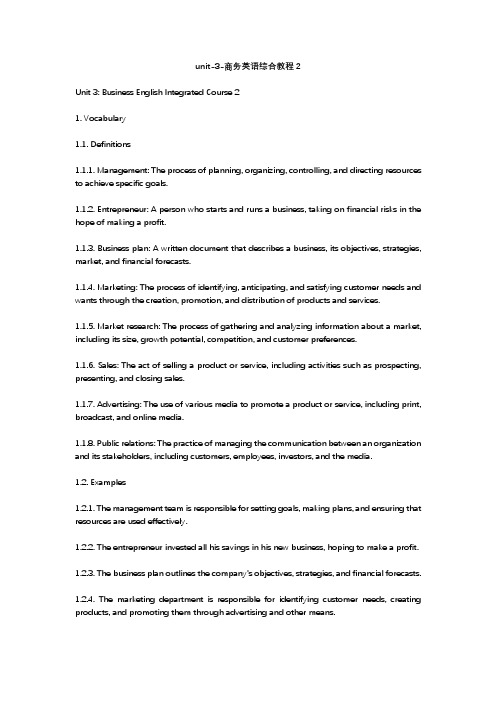
unit-3-商务英语综合教程2Unit 3: Business English Integrated Course 21. Vocabulary1.1. Definitions1.1.1. Management: The process of planning, organizing, controlling, and directing resources to achieve specific goals.1.1.2. Entrepreneur: A person who starts and runs a business, taking on financial risks in the hope of making a profit.1.1.3. Business plan: A written document that describes a business, its objectives, strategies, market, and financial forecasts.1.1.4. Marketing: The process of identifying, anticipating, and satisfying customer needs and wants through the creation, promotion, and distribution of products and services.1.1.5. Market research: The process of gathering and analyzing information about a market, including its size, growth potential, competition, and customer preferences.1.1.6. Sales: The act of selling a product or service, including activities such as prospecting, presenting, and closing sales.1.1.7. Advertising: The use of various media to promote a product or service, including print, broadcast, and online media.1.1.8. Public relations: The practice of managing the communication between an organization and its stakeholders, including customers, employees, investors, and the media.1.2. Examples1.2.1. The management team is responsible for setting goals, making plans, and ensuring that resources are used effectively.1.2.2. The entrepreneur invested all his savings in his new business, hoping to make a profit.1.2.3. The business plan outlines the company's objectives, strategies, and financial forecasts.1.2.4. The marketing department is responsible for identifying customer needs, creating products, and promoting them through advertising and other means.1.2.5. The market research team gathers information about competitors, customer preferences, and market trends to help the company make informed decisions.1.2.6. The sales team is responsible for finding potential customers, presenting the company's products, and closing sales.1.2.7. The advertising campaign used various media, including television, radio, and billboards, to promote the new product.1.2.8. The public relations department manages the company's communication with stakeholders, responding to inquiries from customers, investors, and the media.2. Expressions2.1. Definitions2.1.1. To break even: To earn enough money to cover all costs, without making a profit or a loss.2.1.2. To launch a product: To introduce a new product to the market.2.1.3. To conduct a survey: To gather information by asking questions to a group of people.2.1.4. To target a market: To aim marketing efforts at a specific group of customers who are likely to be interested in a product or service.2.1.5. To negotiate a deal: To discuss terms and conditions with another party in order to reach an agreement.2.1.6. To close a sale: To complete a transaction by selling a product or service to a customer.2.1.7. To handle complaints: To address customer concerns and resolve issues that arise.2.1.8. To issue a press release: To distribute a statement to the media, announcing news or events related to a company.2.2. Examples2.2.1. The company needs to sell 100,000 units of the new product in order to break even.2.2.2. The company will launch the new product next month, with a major advertising campaign.2.2.3. The company conducted a survey to find out what customers thought of the newproduct.2.2.4. The company has targeted the young adult market with its new line of clothing.2.2.5. The company is negotiating a deal with a major supplier to reduce costs.2.2.6. The salesperson was able to close the sale by offering a special discount.2.2.7. The customer service department handled the complaint by offering a refund and an apology.2.2.8. The company issued a press release announcing its new CEO and its plans for expansion.。
商务英语综合教程第二册unit 3 Management
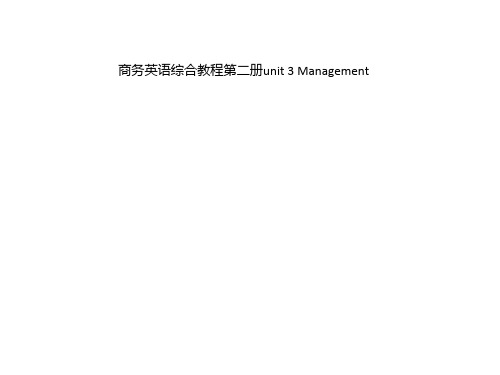
Interpersonal skills
to understand relationships among various tasks
to communicate with other employees and with customers
SKILLS
to perform specific day-to-day tasks, is arranged
Chief Financial Officer
1) Should more funds be borrowed?
2) Should we invest available funds in proposed projects?
Vice-president of Marketing
1) Should an existing product be revised? 2) Should our pricing policies be changed? 3) Should our advertising strategies be changed?
Text Analysis
1. There are at least three general preconditions for achieving lasting success as a manager: ability (A), motivation to manage (M), and opportunity (O). 作为一个管理者要最终成功至少要具有三个基本的先决条件:能力(简 称A),从事管理的动机(简称M) 和机遇(简称0)。 • at least: adv. if nothing else; not less than至少 • precondition n. an assumption on which rests the validity or effect of something else前提 v. put into the required condition beforehand 预先处理;事先准备 例:The US should insist on a substantive agenda as a precondition for any Obama visit. 美国应该坚持将实质性的议事日程作为奥巴马访问的前提。
商务英语综合教程第二册unit 3 Management

The levels of Management
Title
Types of Decisions
Top Management
1) Should we create new products?
President
2) Should we expand?
3) How can we expand? Through acquisitions?
The levels of Management
Title
Types of Decisions
Middle Management
1) How can we boost sales in a particular city?
Regional Sales Manager
2) How can complaints from one of our largest customers be resolved?
Middle management
which is responsible for intermediate and short-term decisions.
Supervisory management
which is highly involved with employees who engage in the day-today production process.
the plant?
The levels of Management
Title
Types of Decisions
Supervisory Management
Account Manager
1) How can workers who process payments from various accounts be motivated?
- 1、下载文档前请自行甄别文档内容的完整性,平台不提供额外的编辑、内容补充、找答案等附加服务。
- 2、"仅部分预览"的文档,不可在线预览部分如存在完整性等问题,可反馈申请退款(可完整预览的文档不适用该条件!)。
- 3、如文档侵犯您的权益,请联系客服反馈,我们会尽快为您处理(人工客服工作时间:9:00-18:30)。
Unit 31. CPI:(consumer price index)居民消费价格指数2. PPI:(producer price index )生产价格指数3. Business cycle经济周期4. Fiscal policy 财政政策:5. equity capital主权资本,股本权益6. Game theory 博弈论7. break even price保本价格8. Producer surplus生产者剩余9. inward-looking: closed; isolated10. miraculous: incredible; marvelous; amazing 11. at the outset of: at the beginning of12. self-sufficient: self-sufficing; self-sustaining13. unleash: release; loose14. exploit: advantage; explore15. tap: exploit16. defy: challenge17. pervasive: permeating18. contraction: cut; reduction; recession19. eradicate: eliminate; wipe out20. inclusive:comprehensive; all-over1. After the industrial revolution, experience-based innovation was increasingly replaced by field experimentation and, later, by science-based experiments conducted in scientific laboratories (substitute)Paraphrase: After the industrial revolution, field experimentation and, later on, science-based experiments which were conducted in science labs have substituted the traditional experience-based innovation.2. So if a developing country knows how to tap the advantage of backwardness in technology, industry, and social and economic institutions, it can grow at an annual rate several times that of high-income countries for decades before closing its income gap with those countries.(exploit; catch up with) Paraphrase: Therefore, if a developing country knows how to exploit its advantage of backwardness in technology, industry, and social and economic institutions by borrowing advanced technology from outside, its annual growth rate will be several times greater than that of rich countries for many decades and thus it might catch up with those countries.3. Stagnation and frequent social and economic crises began to beset most developing countries by the 1970s and 1980s.(be faced with)Paraphrase: By the 1970s and 1980s, most developing countries were faced with economic depression and frequent social and economic crises.4. A well-functioning market is the prerequisite of developing a country’s industries according to thecomparative advantages the country has over other countries. (be the prerequisite)Paraphrase: A well-functioning market is the prerequisite of developing a country’s industries according to the comparative advantages the country has over other countries.5. The spectacular growth over the past three decades far exceeded the expectations of anyone at the outset of the transition, including Deng Xiaoping, the architect of China’s reform and opening-up strategy.Paraphrase: China’s miraculous economic growth over the past thirty years was beyond many people’s expectations set at the beginning of its economic transformation. And Deng Xiaoping, who set the blueprint for China’s reform and opening-up policy, was no exception.1. The acceleration of growth was accompanied by a move of labor from agriculture to manufacturing and services. (Line 5, Para. 5)Paraphrase: Accompanying the quick growth of economy is the transfer of laborers from the primary industry to the secondary and tertiary industries.2. China’s exploitation of the advantage of backwardness has allowed the country to emerge as the world’s workshop and to achieve extraordinary economic growth by reducing the costs of innovation, industrial upgrading, and social and economic transformation.(Line 14, Para.8) Paraphrase: By taking full advantage of its backwardness, China has become the world’s manufacturing center and has achieved amazing economic growth through the cost reduction in innovation, industrial reengineering as well as social and economic transformation.3.The development of modern advanced industries was perceived as the only way to achieve rapid economic takeoff, avoid dependence on the Western industrial powers, and eliminate poverty. (Line 9, Para. 9)Paraphrase: Developing modern advanced industries was regarded as the only means for those transition economies to boost their economic growth, to be independent from Western industrial nations and to eradicate poverty.4.During the transition process China adopted a pragmatic, gradual, dual-track approach. (Line 1, Para.12)Paraphrase: During its transition from command economy to market economy, China has adopted a practical, double-way method.。
